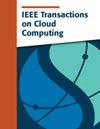个性化云游戏:资源利用和视频编码的多目标优化
IF 5
2区 计算机科学
Q1 COMPUTER SCIENCE, INFORMATION SYSTEMS
引用次数: 0
摘要
云游戏是当代游戏的重要组成部分。为了提高云游戏的体验质量(QoE),动态自适应视频编码(DAVE)与多接入边缘计算(MEC)的集成由于其灵活性和对实时交互的可靠传输支持而成为自然的候选者。然而,随着多个玩家争夺有限的资源来实现个性化的QoE,如超高视频质量和超低延迟,如何支持高效的边缘资源优化是一个基本而重要的问题。此外,在缺乏未来视频和边缘网络资源信息的情况下,实时确定最佳游戏视频编码配置提出了重大挑战。为了解决这些关键问题,我们在软件定义网络(SDN)辅助的边缘网络中,通过主动相互适应视频编码配置和物理资源,共同优化视频编码以及计算和通信资源分配。这消除了编码参数配置和物理资源分配的解耦优化带来的性能瓶颈。sdn辅助的边缘网络架构支持高效的按需资源管理,提供全局网络信息,满足严格的时变游戏需求。针对视频块与物理资源块时间尺度的显著差异,提出了一种新的异步决策多智能体近端策略优化算法(AD-MAPPO),该算法可以解决单智能体的信用分配问题。它还可以适应高度动态的云游戏环境,而无需先验知识和确定性环境模型。基于真实云游戏数据集的大量实验令人信服地证明,我们的方法可以显著提高玩家的整体QoE。本文章由计算机程序翻译,如有差异,请以英文原文为准。
Personalized Cloud Gaming: Multi-Objective Optimization for Resource Utilization and Video Encoding
Cloud gaming represents a major part of contemporary gaming. To boost the Quality-of-Experience (QoE) of cloud gaming, the integration of Dynamic Adaptive Video Encoding (DAVE) with Multi-access Edge Computing (MEC) has become the natural candidate owing to its flexibility and reliable transmission support for real-time interactions. However, as multiple gamers compete for limited resources to achieve personalized QoE, such as ultra-high video quality and ultra-low latency, how to support efficient edge resource optimization is a fundamental and important problem. Furthermore, determining the optimal game video encoding configuration in real-time poses significant challenges, especially when lacking the information on future video and edge network resources. To address these key issues, we jointly optimize the video encoding as well as computing and communication resource allocation by active mutual adaptation of video coding configurations and physical resources in a Software Defined Networking (SDN)-assisted edge network. This eliminates the performance bottleneck caused by decoupling optimization of coding parameter configuration and physical resource allocation. The SDN-assisted edge network architecture supports efficient on-demand resource management, provides global network information, and meets the stringent time-varying game requests. Due to the significant time scale difference between video chunk and physical resource block, we propose a novel Asynchronous Decision-Making Multi Agent Proximal Policy Optimization algorithm (AD-MAPPO), which can address the credit assignment problem with a single agent. It can also adapt to the highly dynamic cloud gaming environment without prior knowledge and a deterministic environmental model. Extensive experimentation based on real cloud gaming datasets convincingly demonstrates that our approach can significantly enhance the overall QoE of gamers.
求助全文
通过发布文献求助,成功后即可免费获取论文全文。
去求助
来源期刊

IEEE Transactions on Cloud Computing
Computer Science-Software
CiteScore
9.40
自引率
6.20%
发文量
167
期刊介绍:
The IEEE Transactions on Cloud Computing (TCC) is dedicated to the multidisciplinary field of cloud computing. It is committed to the publication of articles that present innovative research ideas, application results, and case studies in cloud computing, focusing on key technical issues related to theory, algorithms, systems, applications, and performance.
 求助内容:
求助内容: 应助结果提醒方式:
应助结果提醒方式:


